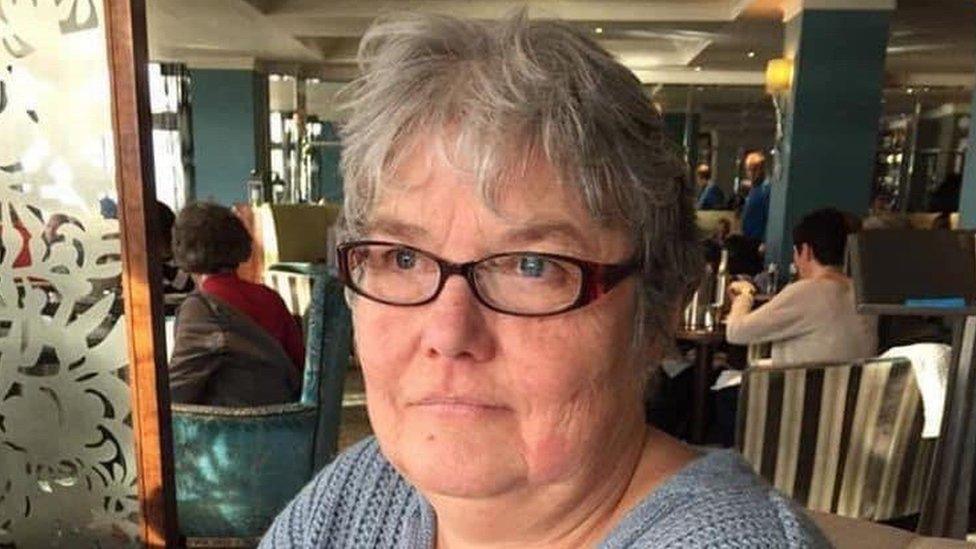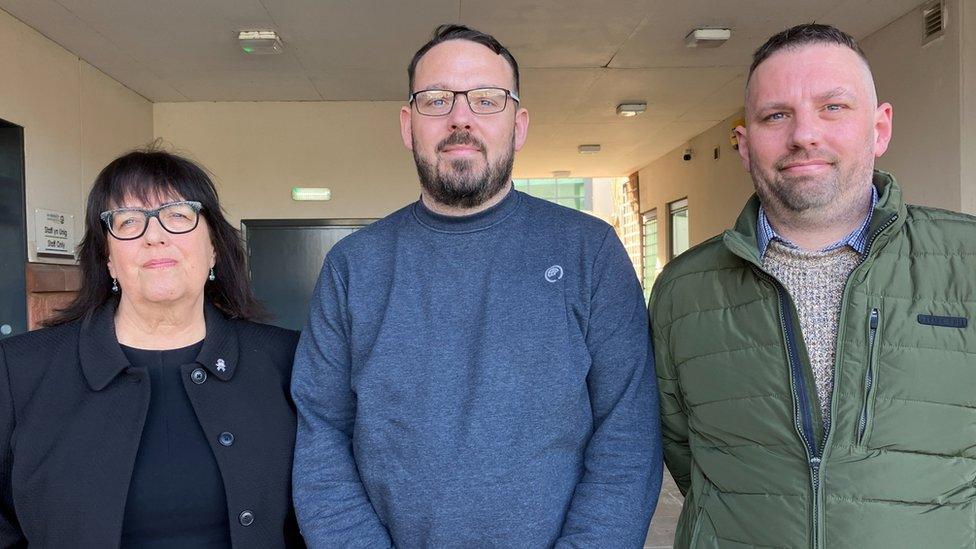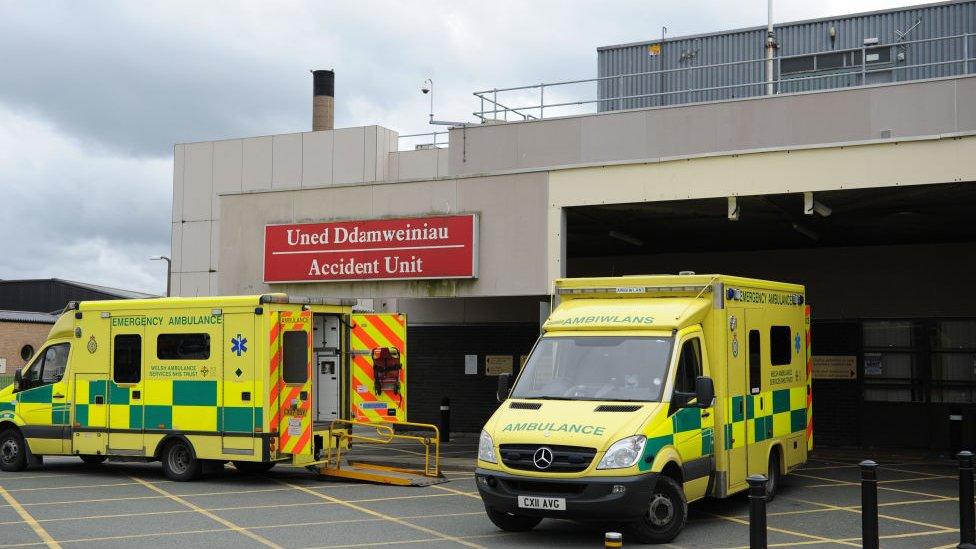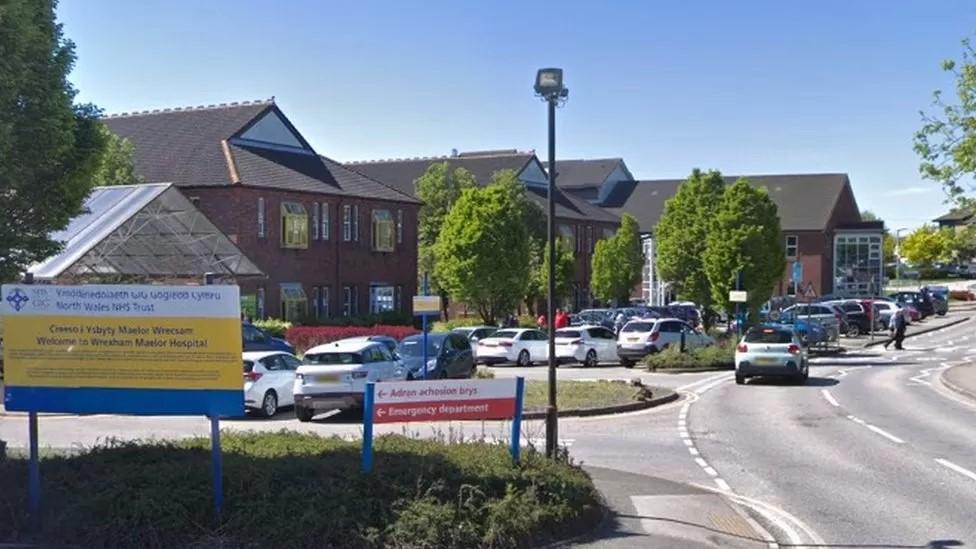Betsi Cadwaladr: Woman who died in stair fall 'failed'
- Published

Janet Jones died after falling down stairs at her sister's home
The family of a woman who died after falling down stairs have said she was "was failed at every level".
Janet Margaret Jones, 61 died at the Royal Stoke Hospital on 20 August 2018, after an accident at her sister's home in Llandudno, Conwy county.
An inquest heard there were delays assessing her at Glan Clwyd Hospital and a lack of overall control.
Betsi Cadwaladr health board said it was "sorry" for "unacceptable failings in her care".
Mrs Jones had a heart and lung condition called idiopathic pulmonary arterial hypertension.
Coroner John Gittins said the lack of a single doctor in charge meant treatment was slower than it should have been.
After the inquest the family said from the moment paramedics arrived, to her death after nearly three days in hospital, their mother had been let down.
They said: "We feel she was failed at every level and not given the very basic (level) of care and treatment that she or anyone else would expect or deserve."
They said worsening of Mrs Jones' condition was "ignored and disregarded" despite the family challenging and alerting staff.
They said "drastic improvement" was needed in care at Betsi Cadwaladr health board.
Mrs Jones, from Moelfre, Anglesey fell down the stairs on 18 August.
During an inquest at Ruthin, consultant and Southampton University lecturer, Rachel Limbrey, said it was "terribly unfair" Mrs Jones was presented at A and E as someone who had had "a drunken fall".
Dr Limbrey said: "Everything took such a long time. There was a lot of squabbling between doctors getting different tests done.
"She was being pushed around a bit without anyone taking overarching responsibility for her as a clinician and advocate."

Janet's sister Lin Woodward, and sons Vince and Dave Jones feel let down by the health service
There was more "faffing around," she said, when Mrs Jones was transferred to Stoke.
The coroner heard rib fractures were not identified in Wales but noticed in Stoke the following day.
Quizzed on whether lying in bed with broken ribs would have exacerbated Mrs Jones' condition Dr Limbrey said: "Damage to the thorassic cavity will reduce the desire to take large breaths in. It will hurt."
She concluded even in the best scenario, Mrs Jones' weakened condition meant she was unlikely to survive after the fall.
A review of Mrs Jones' medical history was carried out by pulmonary hypertension expert Prof David Kiely, of Sheffield Teaching Hospitals.
Prof Kiely said patients would experience breathlessness or light-headedness going up stairs which would have contributed to Mrs Jones' fall.
He said: "Given the combination of a significant fall and trauma, and a very serious and life-threatening condition, her only chance of survival would have been a transfer to the specialist team in Sheffield."
Delivering a narrative verdict the coroner said he was satisfied changes had been made at the two health boards since Mrs Jones' death.
Mr Gittins said Mrs Jones did not have the reserves "to overcome the insult to her body to survive the fall and it was more than her compromised cardiovascular system could cope with".
He concluded she died of pulmonary arterial hypertension exacerbated by injuries caused by falling down stairs.
Betsi Cadwaladr health board's executive medical director Dr Nick Lyons offered "deepest condolences" to Mrs Jones' family.
"We have used the findings from our investigation to make improvements in how care is coordinated and delivered within our emergency departments," he said, "and we will continue to support the emergency department at Ysbyty Glan Clwyd as part of its ongoing improvement programme."
- Published12 March 2023

- Published1 March 2023

- Published28 February 2023
